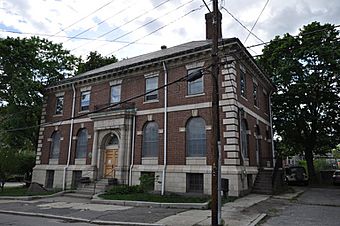Fitchburg Historical Society facts for kids
Quick facts for kids |
|
|
Fitchburg Historical Society
|
|

The society's first building, now used for storage and archives
|
|
| Location | 50 Grove St., Fitchburg, Massachusetts |
|---|---|
| Area | less than one acre |
| Architect | Francis, Henry M., & Sons |
| Architectural style | Classical Revival |
| NRHP reference No. | 03000992 |
| Added to NRHP | October 3, 2003 |
The Fitchburg Historical Society is a special group that works to collect, save, and share the history of Fitchburg, Massachusetts. Think of them as storytellers and guardians of the past! They want to make sure everyone can learn about the people, places, and events that shaped Fitchburg.
The society started way back in 1892. Today, their main office is in the historic Phoenix Building at 781 Main Street. But they also have an important original building. This first building, built in 1912, was designed by a famous local architect named H. M. Francis. It's so special that it was added to the National Register of Historic Places in 2003.
The Fitchburg Historical Society is open three days a week. You can visit them on Mondays and Tuesdays from 10 AM to 4 PM. On Wednesdays, they are open a bit longer, from 10 AM to 6 PM. They offer many cool things for you to explore. You can research your family history, find books about local history in their library, or even volunteer to help them out!
Contents
Discovering Fitchburg's Past
The Fitchburg Historical Society helps everyone in the community connect with their roots. They keep old photos, documents, and objects safe. These items tell the story of how Fitchburg grew and changed over many years. It's like a giant puzzle, and they help put the pieces together.
What is a Historical Society?
A historical society is a group of people who are passionate about history. Their main goal is to preserve the past for future generations. They often have museums, archives, and libraries. These places let you explore old records, learn about local heroes, and see how people lived long ago. They also host events and programs to teach people about history.
The Society's First Home
The society's first headquarters, built in 1912, is a very interesting building. It sits on the west side of Grove Street. Next to it is a small, triangle-shaped park that the society also owns. This building is a great example of old-style architecture.
What Does the Old Building Look Like?
This two-story building is made of strong red bricks. It has fancy terra cotta decorations and a roof covered in slate tiles. The roof slopes down on all sides, which is called a "hip roof." The building has five wide sections on the front and three deep sections on the side.
The windows on the first floor are special. They are shaped like round arches and have decorative terra cotta pieces above them. The corners of the building have special brickwork called "quoins." The roof line is also decorated with small blocks and tooth-like patterns. These details make the building look very grand.
The main entrance is in the middle of the Grove Street side. It has a very fancy design around it. There are columns that look like they are part of the wall. These columns support a decorative beam and a small balcony with an iron railing.
This building was designed by Henry Francis in 1912. He was one of the most important architects in Fitchburg at that time. The building is considered one of the best examples of "Georgian Revival" style in the city. This style brings back ideas from old European buildings. It has not changed much since the society first owned it. Some small updates include storm windows, air conditioning, and using the attic for more storage.
 | Percy Lavon Julian |
 | Katherine Johnson |
 | George Washington Carver |
 | Annie Easley |



